|
Dear colleagues,
We have been silent for a while, waiting not so much for new events to post, but to leave a breathing space for so many affected students and scholars, struggling to shift to online teaching, remote conferencing and research/study in an isolated mode. This all while managing new domestic and care duties, worrying for our own health or that of our family and loved ones near and far. While not everything that came with the pandemic is bad, these are extraordinary times, which require extraordinary measures. It took an unprecedented event like COVID-19 to slow down the world, to make us reconsider the automatism of work and productivity, the frenzy for accumulation and consumerism and the ways in which the virus does not treat us all alike to produce a common humanity but reproduces further sharp disparities and inequalities that will be long lasting. Even if the worst moments of the disease will pass within a few months, the effects on everything else will continue for a long time. New challenges for academic life emerge, as online teaching and activities seem to be prolonged into the Fall, making a return to normal undesirable. The consequence of the emergency will have an impact on occupations and a new generation of students seeking job opportunities, large-scale unemployment and the beginnings of a severe recession in many countries, which is going to disrupt everyone’s lives in social, economic and emotional terms.
The upside is that the planet is breathing again and that new forms of solidarity have emerged, at the local level where the state is failing or is absent, and at the transnational level, i.e. through new forms of collaboration for medical research and support, and through sharing educational resources that makes the sudden shift to online teaching more sustainable and ethical. New forms of communication and ways of keeping in touch under lockdown, quarantine, or self-isolation have emerged, bridging social distancing with intensified digital proximity and co-presence.
So we are presenting here a slightly different newsletter, which reflects on these changing times, as well as providing updates on what has been cancelled, postponed, gone online or been reinvented. We are updating the PCI Facebook page regularly; you can follow it especially for vacancies and other announcements.
Sandra Ponzanesi
Director PCI
|
|

Migrant Belongings: Digital Practices and the Everyday | Conference Postponed to Spring 2021
Spring 2021, Utrecht University
Convenor: Sandra Ponzanesi
Deadlines for submission have also moved to 2021.
- Submission deadline for panels: 31 January 2021
- Submission deadline for abstracts: 15 February 2021
For the final dates and other updates please check the conference website here.
Confirmed keynotes:
- Paul Gilroy (University College London)
- Engin Isin (Queen Mary, University of London)
- Nicholas de Genova (University of Houston)
- Larissa Hjorth (RMIT University, Melbourne)
- Saskia Witteborn (Chinese University of Hong Kong)
Migrant belonging through digital connectivity refers to a way of being in the world that cuts across national borders, shaping new forms of diasporic affiliations and transnational intimacy. This happens in ways that are different from the ways enabled by the communication technologies of the past. Scholarly attention has intensified around the question of how various new technical affordances of platforms and apps are shaping the transnationally connected, and locally situated, social worlds in which migrants live their everyday lives.
This international conference focuses on the connection between the media and migration from different disciplinary vantage points. Connecting with friends, peers and family, sharing memories and personally identifying information, navigating spaces and reshaping the local and the global in the process is but one side of the coin of migrant-related technology use: this Janus-faced development also subjects individual as well as groups to increased datafied migration management, algorithmic control and biometric classification as well as forms of transnational authoritarianism and networked repression.
This conference pays particular attention to the everyday use of digital media for the support of transnational lives, emotional bonds and cosmopolitan affiliations, focusing also on the the role digital media play in shaping local/urban and national diasporic formations. This is because it becomes increasingly important to give everyday digital media usage a central role in investigations of transnational belonging, digital intimacy, diasporic community (re)production, migrant subject formation, long-distance political participation, urban social integration and local/national self-organization.
Therefore we need to examine individual and collective user practices within the wider historical and cultural contexts of media studies, cultural studies and postcolonial cultural studies scholarship, attuned to issues of politics and power, identity, geographies and the everyday. This also creates new challenges for cross-disciplinary dialogues that require an integration of ethnography with digital methods and critical data studies in order to look at the formation of identity and experience, representation, community building, and creating spaces of belongingness.
The conference is part of the ERC project CONNECTINGEUROPE, Digital Crossings in Europe: Gender, Diaspora and Belonging: http://connectingeuropeproject.eu/
Submissions for panels should be submitted to ERC2020@uu.nl by 31 January 2021. Abstracts should be submitted here by 15 February 2021. For more information and the full call for papers, see here. For further questions, contact ERC2020@uu.nl.
|
|

Postcolonial Bauman | 10th Anniversary Lecture Series
3-4 September, University of Leeds
Given the current global uncertainty concerning the risks of travel (as well as possible restrictions on movement, perhaps into September) – the conference will transition into a series of online lectures to celebrate the 10th Anniversary in conjunction with the 3rd PIN conference. Further details on this are forthcoming. For more information and updates, see the conference website.
Confirmed keynotes:
- Etienne Balibar
- Carlo Bordoni
- David Lyon
One of the most prominent and influential intellectuals of our times, Zygmunt Bauman envisaged and practiced sociology as a dialogical activity. Though he is better remembered for being a postmodern than a postcolonial figure, the conference seeks to turn the tables by asking what Bauman might have to offer postcolonial studies, and by corollary what postcolonial critics, who have only rarely engaged with Bauman, might have to say about his work.
Jointly held by the Bauman Institute - celebrating its 10th anniverary - and the Postcolonial Intellectuals and their European Publics Network (PIN), this transdisciplinary conference proceeds in this spirit by inviting a dialogue between Bauman and postcolonial studies, each of which reflects on the compositie figure of 'postcolonial Bauman':
- Postcolonialism and Postcommunism
- Postcolonial Europe
- The Intellectual as Outsider
- The Intellectual as seen from the Outside
Organizing Committee: Professor Griselda Pollock, Dr Mark Davis, Professor Max Silverman, Professor Tony Bryant, Professor Graham Huggan, Dr Jack Palmer, Ms Sarah McLaughlin.
For more information and updates, see here.
|
|
 Reimagining Migration Narratives | Oxford Migration Conference Reimagining Migration Narratives | Oxford Migration Conference
29 May - 5 June
Organized by the Oxford Migration Studies Society in collaboration with Routed Magazine
The Oxford Migration Conference 2020 is going digital and will consist of a series of digital panels. The Oxford Migration Conference 2020 will focus on explaining, comparing and unpacking the stories that surround refugees, migrants and migration. Narratives are powerful instruments in shaping refugee and migrant lives, migration policies and the ways we think about migration. The conference will bring together academics, researchers, practitioners and artists in an interdisciplinary dialogue. The full conference program can be found here.
On May 29th the special issue featuring the full articles, videos and creative submissions will be published as a digital issue of Routed Magazine. The issue will be available to read here.
Register to attend the digital panels here. For more information and updates, see here. For regular updates throughout the conference make sure to follow both Routed Magazine and the Oxford Migration Studies Society on social media.
|
|
We have collected some articles that have appeared in Coronavirus times. We share them here for your interest:
- The pandemic is a Portal by Arundhati Roy
Financial Times, 3 April 2020
"Historically, pandemics have forced humans to break with the past and imagine their world anew. This one is no different. It is a portal, a gateway between one world and the next. We can choose to walk through it, dragging the carcasses of our prejudice and hatred, our avarice, our data banks and dead ideas, our dead rivers and smoky skies behind us. Or we can walk through lightly, with little luggage, ready to imagine another world. And ready to fight for it."
- Biopolitics in the Time of Coronavirus by Daniele Lorenzini
Critical Inquiry, 2 April 2020
“In short, biopolitics is always a politics of differential vulnerability. Far from being a politics that erases social and racial inequalities by reminding us of our common belonging to the same biological species, it is a politics that structurally relies on the establishment of hierarchies in the value of lives, producing and multiplying vulnerability as a means of governing people.”
- Sponaneous Solidarity by Myria Georgiou
Fabian Society, 27 April 2020
Austerity has weakened our institutional ability to respond to this crisis. Myria Georgiou explores how hyperlocal digital activism is filling the gaps.
- Making Migrants Visible to COVID-19 Counting: the Dilemma by Stefania Milan, Annalisa Pelizza and Yoren Lausberg
Open Democracy, 28 April 2020
"While most forms fo data management of populations are problematic, the COVID-19 pandemic requires reconsidering the relationship between data and invisible populations."
- What the Great Pandemic Novels Teach Us by Orhan Pamuk
The New York Times, 23 April 2020
"People have always responded to epidemics by spreading rumor and false information, and portraying the disease as foreign and brought in with malicious intent."
- The Haunting Figure of the Useless Academic: Critical Thinking in Coronavirus Time by Ghassan Hage
European Journal of Cultural Studies, 16 May 2020
"A critical intellectual, someone whose job is to think, reflect and critique can be the last thing one needs in times of practical urgency. If anything such people can be a hindrance to the recovery effort. Pardoxically, in such times, critical intellectuals are more necessary than ever. Pandemics, for instance, invite war metaphors, and unleash reactionary themes of ‘cohesion’, ‘unity’ and ‘common purpose’ that require being challenged. To be a critical intellectual in such times is to be aware of, and learn how to negotiate, such a contradiction."
|
|

Breathable Futures Today
By Magdalena Gorska
"This blog will slowly develop into a space of conversations; a space where I will interview scholars, activists, artists and different critically minded people about what kind of breathable futures they imagine and hope for in the context of current pandemic."
The first interview, with Nina Lykke, is now available to listen and/or read here. More interviews are to follow, with Camila Marambio, Ewa Majewska, Rolando Vazquez, and Ann Cvetkovich and more.
From the interview with Nina Lykke:
“I think that [we need] all the tools related to creative, poetry, arts inspired methodologies, or arts based methodologies, poetry based methodologies, wonder based methodologies […] Wonder can for example also be used vis á vis the sciences, instead of thinking for example in terms of either combating the virus or using the virus for bioscientific purposes (a utilitarian use of the virus as e.g. in bio-sensors). Science is very much pending between these two poles: combating, so called “combating”, for example virus, or thinking in utilitarian ways about it. And the thing is that we would need a lot more wonder in science going beyond these two poles. This would entail thinking for example the virus not either as an enemy or as something useful, but as something else.”
For more information on the project, see here.
|
|
- The Politics of COVID-19
Reading List, 16 March 2020
The first edition of a COVID-19 syllabus. To receive regular updates and highlights from this series, subscribe to the syllabus newsletter here.
- Doing Fieldwork in A Pandemic
Initiated by Deborah Lupton, 17 March 2020
Crowdsourced document on doing fieldwork in a pandemic.
|
|
- We Are One: Global Film Festival
29 May - 7 June
Film festivals worldwide have joined forces a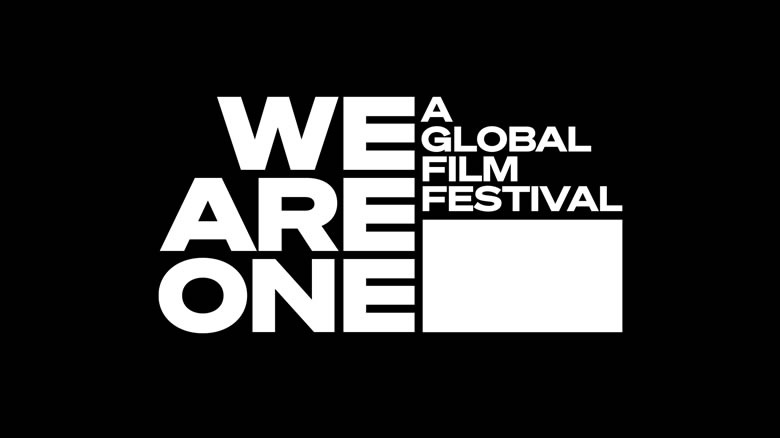 nd present a free online festival on YouTube. 'We Are One: A Global Film Festival' will showcase feature films, shorts, documentaries, comedy, and panel discussions from May 29 to June 7. Some of the planet's biggest and most prestigious film festivals are teaming up to bring this event to life, including Cannes, NYFF, Tiff, Tribeca, Venice, and more. All viewers will be able to make donations to the World Health Organization's Covid-19 Solidarity Response Fund. nd present a free online festival on YouTube. 'We Are One: A Global Film Festival' will showcase feature films, shorts, documentaries, comedy, and panel discussions from May 29 to June 7. Some of the planet's biggest and most prestigious film festivals are teaming up to bring this event to life, including Cannes, NYFF, Tiff, Tribeca, Venice, and more. All viewers will be able to make donations to the World Health Organization's Covid-19 Solidarity Response Fund.
- London Indian Film Festival

The London Indian Film Festival goes online with the Satyajit Ray Prize. With #LoveLiffAtHome, the London Indian Film Festival and the Birmingham Indian Film Festival have joined forces to showcase the winning films of the annual Satyajit Ray Short Film awards. They can be watched for free for a limited time here.
- IDFA
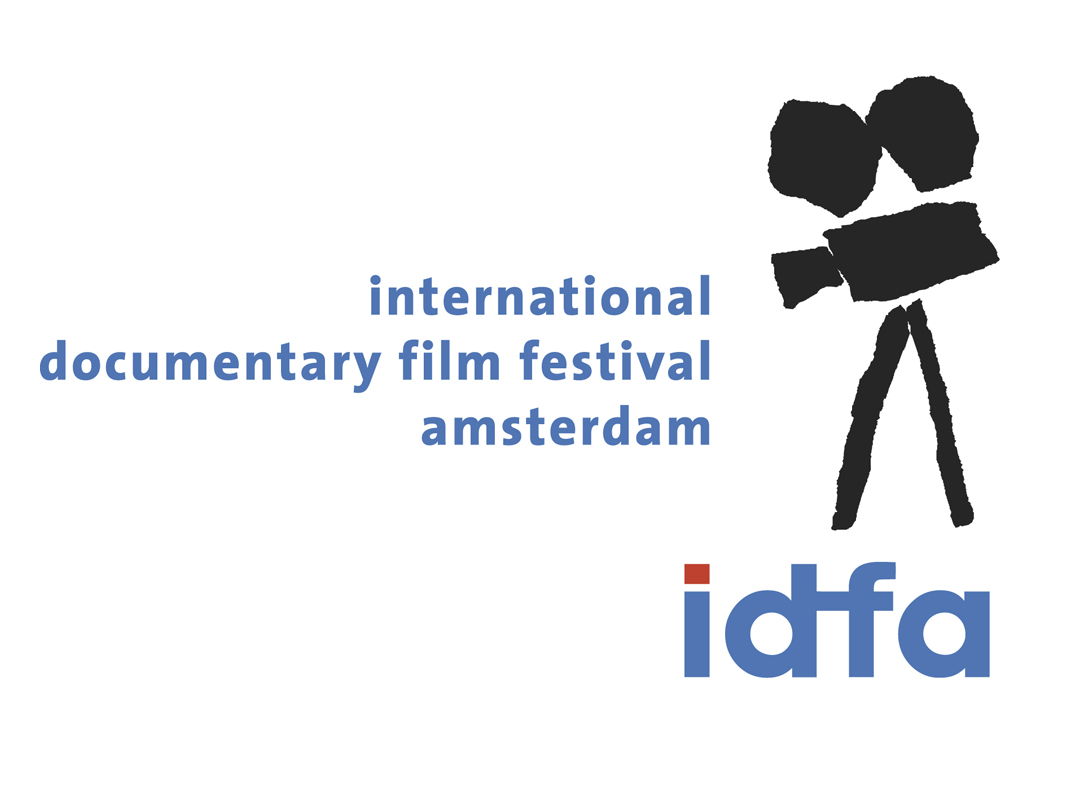
Many IDFA (International Documentary Filmfestival Amsterdam) films are available to watch for free here. Please note that not all films are accessible worldwide.
- BFI

The British Film Institute has a wide variety of short and feature films that are available to watch for free here.
|
|
Postcolonial Intellectuals in Europe: Critics, Artists, Movements, and their Publics | Paperback Edition
Edited by Sandra Ponzanesi and Adriano José Habed
Published by Rowman and Littlefield Publishers
Released in paperback March 2020
 Postcolonial intellectuals have engaged with and deeply impacted upon European society since the figure of the intellectual emerged at the beginning of the nineteenth century. Yet a critical assessment and overview of their influential roles is long overdue, particularly in the light of contemporary debates in Europe and beyond. Postcolonial intellectuals have engaged with and deeply impacted upon European society since the figure of the intellectual emerged at the beginning of the nineteenth century. Yet a critical assessment and overview of their influential roles is long overdue, particularly in the light of contemporary debates in Europe and beyond.
This book offers an innovative take on the role of intellectuals in Europe through a postcolonial lens and, in doing so, questions the very definition of "public intellectual," on the one hand, and the meaning of such a thing as "Europe," on the other. It does so not only by offering portraits of charismatic figures such as Stuart Hall, Jacques Derrida, Antonio Gramsci, Frantz Fanon, and Hannah Arendt, among others, but also by exploring their lasting legacies and the many dialogues they have generated. The notion of the ‘classic’ intellectual is further challenged by bringing to the fore artists, writers, and activists, as well as social movements, networks, and new forms of mobilization and collective engagement that are part of the intellectual scene.
For more information, see here.
|
|
Pluriversal Politics: The Real and the Possible
Arturo Escobar
Published by Duke University Press, April 2020

In Pluriversal Politics Arturo Escobar engages with the politics of the possible and how established notions of what is real and attainable preclude the emergence of radically alternative visions of the future. Reflecting on the experience, philosophy, and practice of indigenous and Afro-descendant activist-intellectuals and on current Latin American theoretical-political debates, Escobar chronicles the social movements mobilizing to defend their territories from large-scale extractive operations in the region. He shows how these movements engage in an ontological politics aimed at bringing about the pluriverse—a world consisting of many worlds, each with its own ontological and epistemic grounding. Such a politics, Escobar contends, is key to crafting myriad world-making stories telling of different possible futures that could bring about the profound social transformations that are needed to address planetary crises. Both a call to action and a theoretical provocation, Pluriversal Politics finds Escobar at his critically incisive best.
For more information, see here.
|
|
Rethinking Cosmopolitanism: Africa in Europe | Europe in Africa
An issue of NKA: Journal of Contemporary African Art
Number 46, May 2020
Special Issue Editors: Salah M. Hassan, Chika Okeke-Agulu

Contributors to this issue reconfigure concepts of art, culture, and politics through the lens of cosmopolitanism. Focusing on the historical and cultural entanglement of Africa and Europe at the intersection of decolonization and modernity, the contributors emphasize the potential of cosmopolitanism to shape possibilities for coexistence and living with difference among all people. Visual and textual essays address the causes and consequences of migration between Africa and Europe; the classification of artistic practices whose roots are not confined to any particular nation; and mid-twentieth-century debates on decolonization, modernity/modernism, and identity through a cosmopolitan viewpoint. Examining cosmopolitanism through theoretical perspectives as well as visual art practices, contributors to this heavily illustrated issue fill in the gaps in contemporary understandings of cultural and political dynamics between Africa and Europe.
For more information, see here.
|
|
Cloud Ethics: Algorithms and the Attributes of Ourselves and Others
Louise Amoore
Published by Duke University Press, May 2020

In Cloud Ethics Louise Amoore examines how machine learning algorithms are transforming the ethics and politics of contemporary society. Conceptualizing algorithms as ethicopolitical entities that are entangled with the data attributes of people, Amoore outlines how algorithms give incomplete accounts of themselves, learn through relationships with human practices, and exist in the world in ways that exceed their source code. In these ways, algorithms and their relations to people cannot be understood by simply examining their code, nor can ethics be encoded into algorithms. Instead, Amoore locates the ethical responsibility of algorithms in the conditions of partiality and opacity that haunt both human and algorithmic decisions. To this end, she proposes what she calls cloud ethics—an approach to holding algorithms accountable by engaging with the social and technical conditions under which they emerge and operate.
For more information, see here.
|
|
Poor Queer Studies: Confronting Elitism in the University
Matt Brim
Published by Duke University Press, March 2020
 In Poor Queer Studies Matt Brim shifts queer studies away from its familiar sites of elite education toward poor and working-class people, places, and pedagogies. Brim shows how queer studies also takes place beyond the halls of flagship institutions: in night school; after a three-hour commute; in overflowing classrooms at no-name colleges; with no research budget; without access to decent food; with kids in tow; in a state of homelessness. Drawing on the everyday experiences of teaching and learning queer studies at the College of Staten Island, Brim outlines the ways the field has been driven by the material and intellectual resources of those institutions that neglect and rarely serve poor and minority students. By exploring poor and working-class queer ideas and laying bare the structural and disciplinary mechanisms of inequality that suppress them, Brim jumpstarts a queer-class knowledge project committed to anti-elitist and anti-racist education. Poor Queer Studies is essential for all of those who care about the state of higher education and building a more equitable academy. In Poor Queer Studies Matt Brim shifts queer studies away from its familiar sites of elite education toward poor and working-class people, places, and pedagogies. Brim shows how queer studies also takes place beyond the halls of flagship institutions: in night school; after a three-hour commute; in overflowing classrooms at no-name colleges; with no research budget; without access to decent food; with kids in tow; in a state of homelessness. Drawing on the everyday experiences of teaching and learning queer studies at the College of Staten Island, Brim outlines the ways the field has been driven by the material and intellectual resources of those institutions that neglect and rarely serve poor and minority students. By exploring poor and working-class queer ideas and laying bare the structural and disciplinary mechanisms of inequality that suppress them, Brim jumpstarts a queer-class knowledge project committed to anti-elitist and anti-racist education. Poor Queer Studies is essential for all of those who care about the state of higher education and building a more equitable academy.
For more information, see here.
|
|
Why Race Still Matters
Alana Lentin
Published by Polity, April 2020
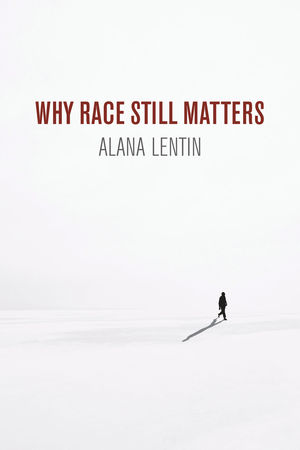 Why are you making this about race?' This question is repeated daily in public and in the media. Calling someone racist in these times of mounting white supremacy seems to be a worse insult than racism itself. In our supposedly post-racial society, surely it’s time to stop talking about race? Why are you making this about race?' This question is repeated daily in public and in the media. Calling someone racist in these times of mounting white supremacy seems to be a worse insult than racism itself. In our supposedly post-racial society, surely it’s time to stop talking about race?
This powerful refutation is a call to notice not just when and how race still matters but when, how and why it is said not to matter. Race critical scholar Alana Lentin argues that society is in urgent need of developing the skills of racial literacy, by jettisoning the idea that race is something and unveiling what race does as a key technology of modern rule, hidden in plain sight. Weaving together international examples, she eviscerates misconceptions such as reverse racism and the newfound acceptability of 'race realism', bursts the 'I’m not racist, but' justification, complicates the common criticisms of identity politics and warns against using concerns about antisemitism as a proxy for antiracism.
Dominant voices in society suggest we are talking too much about race. Lentin shows why we actually need to talk about it more and how in doing so we can act to make it matter less.
For more information, see here.
|
|
Decolonizing Ethnography: Undocumented Immigrants and New Directions in Social Science
Carolina Alonso Bejarano, Lucia López Juárez, Mirian A. Mijangos García, Daniel M. Goldstein
Published by Duke University Press, May 2020
 In August 2011, ethnographers Carolina Alonso Bejarano and Daniel M. Goldstein began a research project on undocumented immigration in the United States by volunteering at a center for migrant workers in New Jersey. Two years later, Lucia López Juárez and Mirian A. Mijangos García—two local immigrant workers from Latin America—joined Alonso Bejarano and Goldstein as research assistants and quickly became equal partners for whom ethnographic practice was inseparable from activism. In Decolonizing Ethnography the four coauthors offer a methodological and theoretical reassessment of social science research, showing how it can function as a vehicle for activism and as a tool for marginalized people to theorize their lives. Tacking between personal narratives, ethnographic field notes, an original bilingual play about workers' rights, and examinations of anthropology as a discipline, the coauthors show how the participation of Mijangos García and López Juárez transformed the project's activist and academic dimensions. In so doing, they offer a guide for those wishing to expand the potential of ethnography to serve as a means for social transformation and decolonization. In August 2011, ethnographers Carolina Alonso Bejarano and Daniel M. Goldstein began a research project on undocumented immigration in the United States by volunteering at a center for migrant workers in New Jersey. Two years later, Lucia López Juárez and Mirian A. Mijangos García—two local immigrant workers from Latin America—joined Alonso Bejarano and Goldstein as research assistants and quickly became equal partners for whom ethnographic practice was inseparable from activism. In Decolonizing Ethnography the four coauthors offer a methodological and theoretical reassessment of social science research, showing how it can function as a vehicle for activism and as a tool for marginalized people to theorize their lives. Tacking between personal narratives, ethnographic field notes, an original bilingual play about workers' rights, and examinations of anthropology as a discipline, the coauthors show how the participation of Mijangos García and López Juárez transformed the project's activist and academic dimensions. In so doing, they offer a guide for those wishing to expand the potential of ethnography to serve as a means for social transformation and decolonization.
For more information, see here.
|
|
Italia senza frontiere/Borderless Italy
Issue of California Italian Studies
Volume 9, Issue 1, 2019
Special Editors: Claudio Fogu, Stephanie Malia Hom, Laura E. Ruberto, Leslie Elwell
 This publication explores 'Borderless Italy' from various perspectives: Border Imaginaries - Geographies; Border Imaginaries - Genre; Border Imaginaries - Politics. In this publication, you will find included articles in both English and Italian, written by Áine O'Healy, Gabriele Montalbano, Federica Di Blasio, Arianna Fognani, Alessandro Boccolini, Lucia Re and Kelly Roso, Rachel Haworth and Laura Rorato, Luigi Cazzato, Giuliana Muscio, Eleonora Meo, Amanda Batarseh, Francesco D'Antonio, Mariana Aguirre, Nelson Shuchmacher Endebo, Heather R. Sottong, John Agnew, Eveljn Ferraro, SA Smythe, and Jon R. Snyder and Megan Williamson.
For more information and access, see here.
|
|
A Companion to Federico Fellini
Edited by Frank Burke, Marguerite Waller and Marita Gubavera
Published by Wiley-Blackwell, March 2020
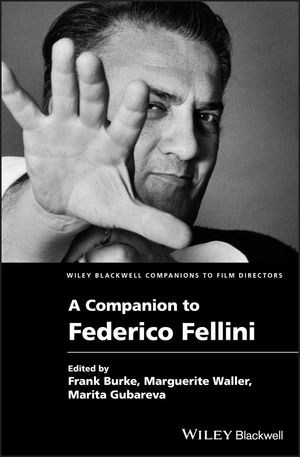
The Wiley Blackwell Companion to Federico Fellini presents new methodologies and fresh insights for encountering, appreciating, and contextualizing the director’s films in the 21st century. A milestone in Fellini scholarship, this volume provides contributions by leading scholars, intellectuals, and filmmakers, as well as insights from collaborators and associates of the Italian director. Scholarly yet readable essays explore the fundamental aspects of Fellini’s works while addressing their contemporary relevance in contexts ranging from politics and the environment to gender, race, and sexual orientation.
As the centennial of Federico Fellini’s birth in approaches in 2020, this timely work provides new readings of Fellini’s films and illustrates Fellini’s importance as a filmmaker, artist, and major cultural figure. The text explores topics such as Fellini’s early cinematic experience, recurring themes and patterns in his films, his collaborations and influences, and his unique forms of cinematic expression. In a series of “Short Takes” sections, contributors look at specific films that have particular significance or personal relevance. The Wiley Blackwell Companion to Federico Fellini is an indispensable resource for students, instructors, and scholars of Fellini, Italian cinema, cinema and art history, and all areas of film and media studies.
For more information, see here.
|
|
Theorising Media & Conflict
Edited by Philipp Budka and Birgit Bräuchler
Published by Berghahn, April 2020
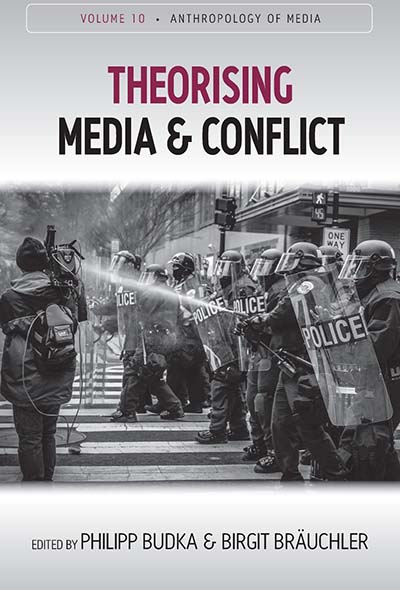 Theorising Media and Conflict brings together anthropologists as well as media and communication scholars to collectively address the elusive and complex relationship between media and conflict. Through epistemological and methodological reflections and the analyses of various case studies from around the globe, this volume provides evidence for the co-constitutiveness of media and conflict and contributes to their consolidation as a distinct area of scholarship. Practitioners, policymakers, students and scholars who wish to understand the lived realities and dynamics of contemporary conflicts will find this book invaluable. Theorising Media and Conflict brings together anthropologists as well as media and communication scholars to collectively address the elusive and complex relationship between media and conflict. Through epistemological and methodological reflections and the analyses of various case studies from around the globe, this volume provides evidence for the co-constitutiveness of media and conflict and contributes to their consolidation as a distinct area of scholarship. Practitioners, policymakers, students and scholars who wish to understand the lived realities and dynamics of contemporary conflicts will find this book invaluable.
For more information, see here.
|
|
The activities of the PCI are organized in collaboration with The Graduate Gender Programme and Institution for Open Society (Hub Gender and Diversity)

|
|
|
|
|